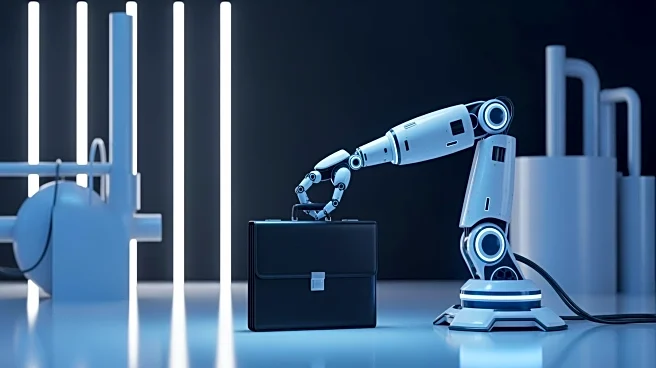What's Happening?
The increasing implementation of artificial intelligence (AI) in various industries is leading to significant job losses and operational challenges in the United States. Workers from different sectors,
including insurance and customer service, are sharing their experiences of being replaced by AI systems. In one instance, a former employee of a major U.S.-based insurance carrier described how AI was used to automate policy generation and claims processing, resulting in layoffs and increased workloads for remaining staff. The company reportedly laid off its entire intake team and restructured performance metrics, making them difficult to achieve, which led to further dismissals. The shift to AI has also resulted in the loss of experienced personnel, particularly in departments like fraud detection, which has left companies vulnerable to fraud rings.
Why It's Important?
The transition to AI-driven processes in the workplace has significant implications for the U.S. labor market and industry standards. While AI can enhance efficiency and reduce costs, it also poses risks such as job displacement and increased error rates in critical operations. The loss of experienced employees can lead to a decline in service quality and increased vulnerability to operational risks, such as fraud. This shift raises concerns about the ethical and legal responsibilities of companies as they navigate the balance between technological advancement and workforce stability. The potential for lawsuits due to AI-related errors highlights the need for careful implementation and oversight of AI systems.
What's Next?
As AI continues to be integrated into more industries, companies may face increased scrutiny from regulators and the public regarding their employment practices and the reliability of AI systems. There may be calls for stronger regulations to protect workers and ensure that AI systems are implemented responsibly. Companies might need to invest in retraining programs for displaced workers and develop strategies to mitigate the risks associated with AI errors. The ongoing dialogue about the role of AI in the workplace is likely to influence future labor policies and corporate strategies.
Beyond the Headlines
The broader implications of AI adoption extend beyond immediate job losses. There is a cultural shift occurring as industries adapt to new technologies, which may redefine traditional roles and require new skill sets. The ethical considerations of AI use, such as data privacy and decision-making transparency, are becoming increasingly important. As AI systems become more prevalent, there is a growing need for public discourse on the societal impacts of automation and the future of work.










